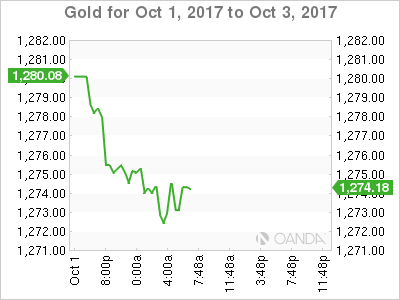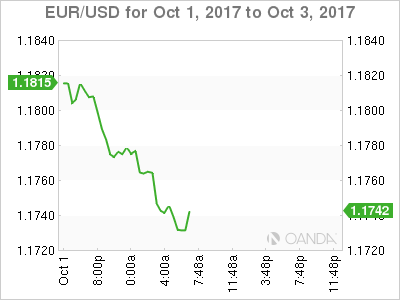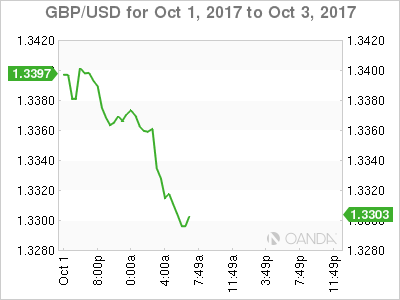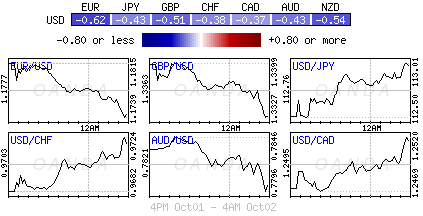Investing.com’s stocks of the week
Monday October 2: Five things the markets are talking about
The ‘mighty’ U.S dollar remains bid along with Treasury yields as investors contemplate the markets outlook for U.S tax cuts as well as the chances of a new, and potentially less ‘dovish’ Fed Chief.
In currencies, the EUR (€1.1741) has retreated in the wake of a controversial vote for independence in the Spanish region of Catalonia. The region is now on track towards a declaration of independence – results showed that +90% of voters backed independence (with a turnout of +2.3M), while GBP (£1.3310) trades under pressure ahead of this week’s U.K Conservative Party’s annual conference where there could be challenges to PM Theresa May’s leadership.
Elsewhere, this week, there will be a number of central bank policy announcements – the Reserve Bank of Australia (RBA), the Reserve Bank of India (RBI) and the European Central Bank (ECB).
No change is expected down-under, while slow growth in India and muted inflation would suggest a cut from the RBI, while forward guidance is looked for from the ECB regarding QE.
Manufacturing PMI’s for September are due for most of the world’s major economies – the U.S ISM measure comes this morning at 10:00 am ETD.
In North America, Canada and the U.S will round off this busy week with their respective employment reports on Friday.
1. Global stocks mixed results
Asian equity markets opened higher after stronger China PMI over the weekend and a cut by the People’s Bank of China (PBoC) to their reserve requirement ratio (RRR).
Note: China (closed all week), Hong Kong, India and South Korean markets closed for holidays so liquidity remained light.
In Japan, the Nikkei rose to a 25-month high, +0.2%, as the yen (¥112.78) weakened outright following ‘hawkish’ rhetoric from the Fed. Ongoing N. Korea concerns continue to cap the index. The broader Topix index dropped -0.1%.
Down-under, Australia’s S&P/ASX 200 Index gained +0.8%, with resources companies climbing on optimism China’s growth slowdown will be modest.
In Europe, the Spanish Ibex trades lower after Catalan referendum. Catalonia says they are on track towards declaration of independence. The referendum has lead to a constitutional crisis in Spain and is beginning to spread jitters to peripheral markets.
U.S stocks are set to open in the ‘black’ (+0.1%).
Indices: Stoxx50 +0.2% at 3,591, FTSE +0.5% at 7,407, DAX +0.3% at 12,871, CAC 40 flat at 5,330, IBEX 35 -1.2% at 10,261, FTSE MIB -0.1% at 22,682, SMI +0.4% at 9,194, S&P 500 Futures +0.1%
2. Oil slips after Q3 rally, gold lower
Oil trades under pressure as an increase in U.S drilling and higher OPEC output has put the brakes on a rally that recorded its biggest Q3 gain in 13-years.
Last week, U.S energy companies’ added oil rigs for the first week in seven, while Iraq announced its exports increased slightly in September.
Brent crude is down -12c at +$56.67 a barrel – it recorded a Q3 gain of around +20%, the biggest Q3 increase since 2004 and traded as high as $59.49 last week. U.S. crude (WTI) is down -17c at +$51.50. The benchmark posted its strongest quarterly gain since Q2 2016.
Note: Signs that a three-year supply glut is easing helped by a production cut deal by OPEC and non-OPEC members, have driven the ‘Black gold’s’ rally.
Overnight, gold slipped to its lowest in nearly two-months as the U.S dollar rallied and global equities gained, while growing expectations for a Fed interest rate hike in December also added to pressure. Spot gold is down -0.4% at +$1,273.60 an ounce.

3. U.S yields rally
Firming expectations that the Fed will hike rates in December coupled with domestic data pointing to steady growth in the U.S and talk of a potentially more hawkish successor to Fed Chair Janet Yellen is helping to push U.S yields higher.
Ten-year yields are trading atop of +2.37%; it’s highest yield since mid-July, which has also pushed the dollar +0.5% higher against a basket of currencies.
Note: Speculation that President Trump could choose former Fed Governor Kevin Warsh, who is considered more ‘hawkish’ than Yellen, to replace her as head of the Fed.
Elsewhere, Germany 10-Year Bund yield gained +2 bps to +0.48%, the highest in two-months. In the U.K, 10-Year Gilt yield has advanced +2 bps to +1.39%, the highest in eight-months.
Note: Spain 10-Year government bond yields rallied as much as +7 bps to +1.69%, taking the gap between them and German benchmarks close to its widest in nearly four-months.

3. EUR’s Catalan Woes
The EUR (€1.1742) trades under pressure after the Spanish Catalan independence referendum, in which an overwhelming majority voted to separate from Spain.
Note: The ballots represented only about +40% of eligible voters in the region.
Expect the pound to be fuelled by political mongering. In Manchester U.K this week, the Conservative Party’s annual conference is taking place and its expected to be awash with rumors of potential challenges to PM May’s leadership. Also investors should expect some fierce arguments about the shape that Brexit should take.

5. U.K manufacturing PMI below forecasts
The purchasing managers’ index on U.K. manufacturing activity falls to 55.9 in September, from 56.7 in August, below the consensus forecast for 56.4.
IHS Markit, which compiles the survey, said production and new orders rose at above long-run average rates, but cost inflationary pressures “surged higher.”
“Although it looks as if the sector made solid progress through the Q3, the growth slowdown in September is a further sign that momentum is being lost across the broader U.K. economy,” said Rob Dobson, director at IHS Markit.
The U.K. economy has slowed markedly this year as inflation, which accelerated sharply after sterling’s steep post-Brexit depreciation, began to outpace wages and squeeze the ever-important U.K consumer.

